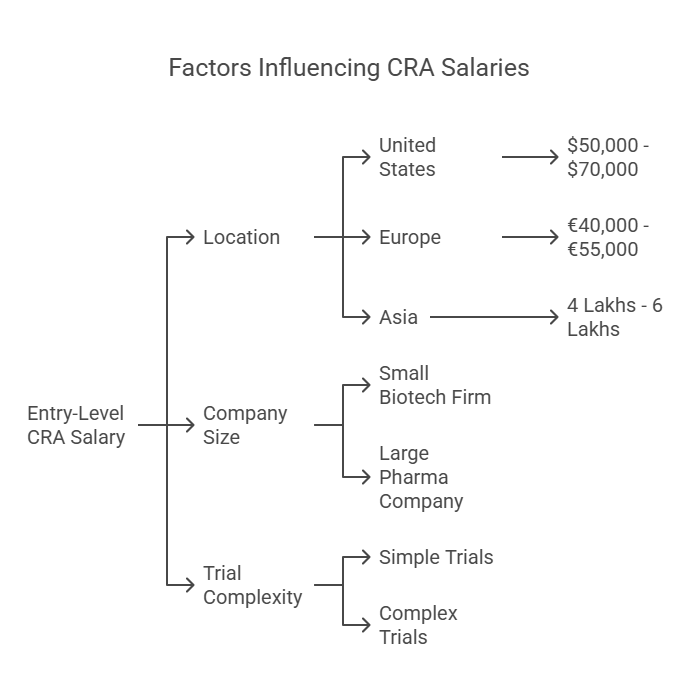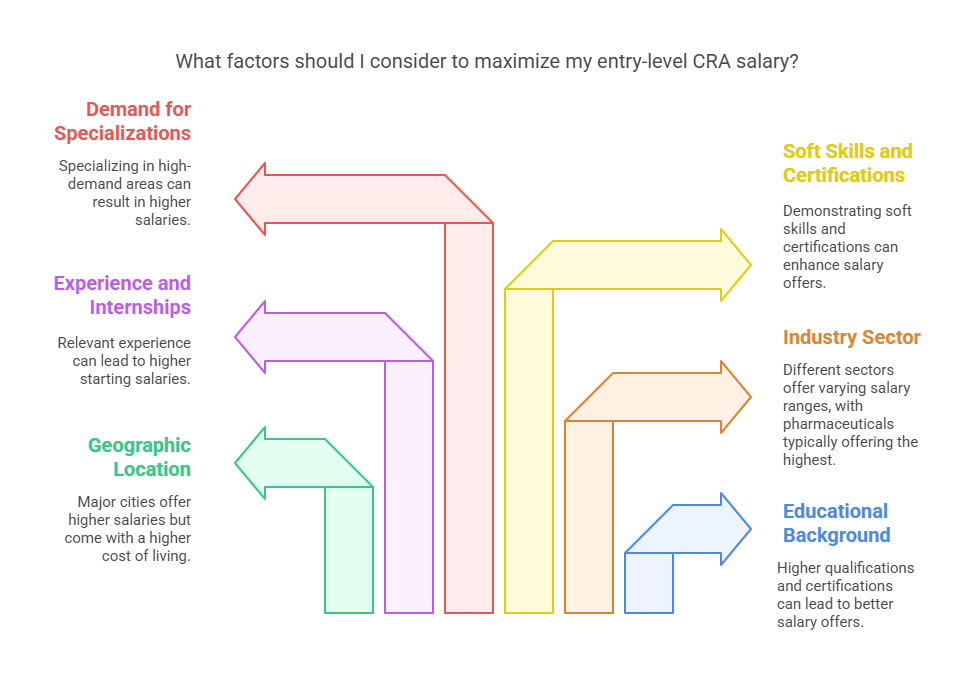Clinical Research Associate Salary Entry Level
Clinical research is a growing field; there are many people interested in the field and wanting to become a Clinical Research Associate (CRA). These professionals are pivotal to the development of new treatments and medical advancements by monitoring that clinical trials follow regulatory guidelines, ethical standards, and research protocols. As with any career, one of the most common questions for newcomers is, "What can I expect in terms of salary as an entry-level Clinical Research Associate?"
In this blog, we will explore the factors that influence a CRA’s entry level salary, break down potential earnings and see what professionals can expect as they gain experience. This guide is for those just starting their career in clinical research, and will help you understand the financial rewards of this exciting and impactful profession.
What is a Clinical Research Associate (CRA)?
Before even looking into the numbers, it is crucial to understand what the role of a Clinical Research Associate entails. This position entails supervising clinical trials that evaluate new drugs, treatments, and medical devices. Their duties often include:
Monitoring trial sites to ensure compliance with study protocols
Ensuring that data collection is accurate and complete
Verifying that the rights and safety of participants are protected
Liaising with medical professionals, sponsors, and regulatory bodies
A very detail oriented job that requires the knowledge of Good Clinical Practice (GCP), clinical trial phases and the regulatory landscape of the medical research industry. They are the CRAs, who work with research teams and sponsors to make sure the trials run safely and smoothly.
Average Entry-Level Clinical Research Associate Salary
Clinical Research Associate (CRA) entry level salaries will depend on the location, company size, and the size of the trial. For instance, in the United States, the salary of a newly hired CRA is between $50,000 and $70,000 per year. On the lower end, this salary is for positions in smaller markets or with companies that have limited research projects. In larger metropolitan areas, salaries can be towards the higher end of this range due to the competition for CRAs and the complexity of the projects.
Regional Variations
United States: As was mentioned before, the normal range for entry level CRA salaries is $50,000 to $70,000. Revenues can rise even for entry level CRA’s with specialized skills like regulatory affairs or a certain kind of clinical trial (e.g., oncology).
Europe: In the UK, Germany and France, entry level salaries are anywhere between €40,000 and €55,000 a year. Cost of living, and the need for medical research professionals will determine the salary figures.
Asia: In regions such as India, and Southeast Asia, entry level CRA salaries are generally lower because of the different economic conditions. For instance, in India, entry level CRAs can expect to earn an average salary of 4 Lakhs to 6 Lakhs per year.
Company Size and Trial Complexity
Salaries also vary depending on whether a CRA works for a small biotech firm, a large pharmaceutical company or a contract research organization (CRO). Some firms are entry level lower paying, but with faster career growth. However, big pharma and CROs have attractive salaries and clear career progression, but the company's size may slow down the promotion process.
Moreover, the clinical trial complexity contributes to the variation in CRAs' salaries. CRAs who are involved in global multi-center trials especially in high demand areas such as oncology or rare diseases may start with a higher salary than those in simpler studies.
Key Factors Influencing Entry-Level CRA Salaries
1. Educational Background
The most significant factor that determines the entry level CRA's salary is educational qualifications. A bachelor's degree in life sciences is usually the minimum requirement, but those with a Master's in Clinical Research or other relevant certifications can start at a higher salary. Top tier graduates or those with specialized research skills are more likely to get competitive offers.
Some relevant certifications for aspiring CRAs include:
Certified Clinical Research Professional (CCRP)
Certified Clinical Research Coordinator (CCRC)
Advanced Clinical Medical Scribe Certification Course
Having a certification showcases a higher level of expertise and can position you for quicker salary growth.
2. Geographic Location
Another significant factor is location. Clinical research is usually focused in major metropolitan hubs like New York, Los Angeles, London, and Berlin. CRAs in these areas can expect higher salaries because of higher demand and the cost of living is also high. However, entry level salaries may be lower in smaller cities or rural areas, but there is the benefit of less competition for roles.
Furthermore, international clinical research organizations may charge different rates according to the area in which the research is conducted, and several people opine that moving to a high demand area can greatly increase your earnings.
3. Industry Sector
There is a clear distinction between the salaries offered in biotech, pharmaceuticals and medical devices in the industry. The pharmaceutical companies are often leading in salary offers, while biotech firms are also quite generous. CROs that manage clinical trials for various sponsors are usually quite attractive in terms of salary, although they may not match those of in-house positions at pharmaceutical giants.
Pharmaceutical Companies: Because of the complexity and the number of trials they oversee, they are often offered entry-level salaries on the higher end of the scale, ranging between $60,000 to $75,000.
Biotechnology Firms: Salaries are competitive, typically ranging from $55,000 to $70,000.
Contract Research Organizations (CROs): They pay according to the size of the organization and its location but are between $50,000 and $65,000 for entry-level. These organizations.
4. Experience and Internships
Although this blog post is oriented towards beginning wages, it is crucial to consider that internships or experience in clinical trials can be a plus when it comes to setting salary demands. There are higher starting salaries for candidates who have done internships in clinical research, data management, or regulatory affairs.
Employers highly value candidates who have had exposure to clinical trials, even at the entry level, because it reduces training time and increases the likelihood of the new hire succeeding in the role.
5. Soft Skills and Certifications
Along with the technical skills that are necessary for the job, CRAs must have certain set of skills that will enable him/her to perform well in the position. These include communication skills, problem solving, time management and the ability to work under pressure, which are some of the qualities that are often associated with successful CRAs.
Candidates who demonstrate these skills during interviews, along with a certification in clinical research, often receive higher offers.
6. Demand for CRAs in Specific Therapeutic Areas
All CRAs are not the same, especially in entry level positions. Oncology, neurology, cardiology and rare diseases are just some of the specialties that fetch higher salaries because of the complexity and life-alternating consequences of these disciplines. If you are just starting out and can specialize in one of these high demand therapeutic areas, you may well see a bump in your starting salary.
Salary Growth Over Time
Salaries for entry level CRAs are expected to rise with company experience and project complexity. The majority of CRAs progress to the Senior CRA or Clinical Trial Manager position within a few years, earning between $80,000 and $100,000 or more, depending on location and industry.
Furthermore, the possibility of moving into regulatory affairs, project management or business development becomes available for CRAs as they learn the intricacies of clinical research operations. The career progression to higher salaries continues in this manner.
Conclusion
Becoming a Clinical Research Associate offers not only an exciting career in the development of medical treatments but also the potential for a rewarding salary. Entry-level CRAs can expect to earn between $50,000 and $70,000 in the U.S., with global variations influenced by geographic location, industry sector, and specific expertise. Factors such as educational background, internships, and specialization in high-demand areas can all impact starting salaries. For those entering this field, the potential for salary growth and career advancement is substantial, making the role of a CRA a lucrative and fulfilling career choice.
If you're just beginning your journey, consider pursuing relevant certifications, specializing in a therapeutic area, and building up your experience through internships to enhance your salary prospects. As you grow in this role, so will your earning potential, paving the way for an impactful and financially rewarding career in clinical research.
Reference Links:
National Institutes of Health (NIH) – Clinical Research Associate Career Path
ClinicalTrials.gov – A Service of the U.S. National Library of Medicine
Relevant Course Links:
Frequently Asked Questions (FAQs)
-
To become a Clinical Research Associate, you typically need a bachelor's degree in life sciences, nursing, or a related field. Higher qualifications like a Master's or certifications such as Certified Clinical Research Professional (CCRP) can enhance your employability and starting salary.
-
Typically, it takes about 2 to 5 years of experience in clinical research to progress from an entry-level CRA to a Senior CRA. This timeframe can vary based on the complexity of the clinical trials you work on and your professional development efforts.
-
Yes, pharmaceutical companies generally offer the highest salaries for CRAs, followed by biotechnology firms and contract research organizations (CROs). The industry's focus, such as oncology or neurology, can also influence the salary due to the complexity and demand in specific therapeutic areas.



